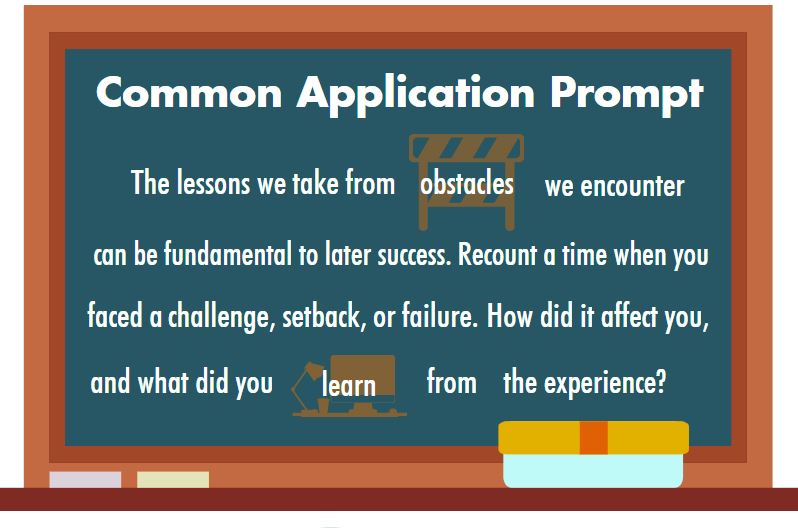College Essay prompts should not address life hardships
Graphic by Meimei Greenstein.
April 26, 2018
“The lessons we take from obstacles we encounter can be fundamental to later success. Recount a time when you faced a challenge, setback, or failure. How did it affect you, and what did you learn from the experience?”
This question was one of seven prompts used in the 2017-2018 Common Application, which will be repeated for the 2018-2019 Common Application. Every year, the application platform poses a variation of this same question to seniors writing college applications. How have your hardships affected you? Though this question seems harmless enough, it ends up promoting a counterproductive mindset of lies and emotional manipulation.
Granted, I’m a junior, so I haven’t undergone the application process yet and am not an expert on college essays. That being said, I’m already feeling the burden that this type of essay imposes on a student. Specifically, the culture of hyperbole it creates.
“Recount a time when you faced a challenge, setback, or failure.”
This portion of the question is straight-forward enough: everyone has experienced difficulty at some point in their lives prior to writing their application. Yet, this infamous prompt has spawned the fateful statement, “It’ll make a good college essay story” when something goes wrong in a person’s life. Going to a concert in a dangerous part of town? Maybe if you’re stabbed, it’ll make a perfect college essay! Traveling abroad and losing your passport? An ideal college essay!
The desire for a suitable college essay experience has also sparked an epidemic of false narratives. Many applicants will implement hyperbole in their responses to the prompt to seem more inspirational. After all, will college admissions really know if you fabricate or exaggerate a couple of facts? This tendency undermines the point of the college essay: for admissions officers to read an honest and real snapshot of an applicant’s life, not to judge their ability to form a false narrative.
“How did it affect you, and what did you learn from the experience?”
The framing of this part of the question implies that most every negative–or even traumatic–experience that happens to an individual has a positive aspect to it. By asking “what did you learn?” the question demands the applicant extract a “moral of the story” from their experience. This renders the prompt ineffective because the fact of the matter is that, sometimes, the difficult life experiences we face are just detrimental to growth. There isn’t always a silver lining or inherent moral of the story. Sometimes, a hardship is just a hardship.
The point of a college essay is to enable the admissions officials to understand a fragment of each applicant’s personality, work ethic and passions from how they describe their life. But by encouraging students to discuss a setback they’ve experienced, application platforms are doing them a disservice, prompting the twisting of their life events to fit the narrative. Now, this prompt isn’t a mandatory topic, and there are schools with more in-depth supplemental essays that better allow admissions officers to begin to understand the applicant. But this isn’t sufficient because it isn’t true across the board.
In order to ensure that colleges receive a genuine profile of their applicants, the Common Application and other platforms should do away with superficial essay prompts in lieu of something more genuine.









